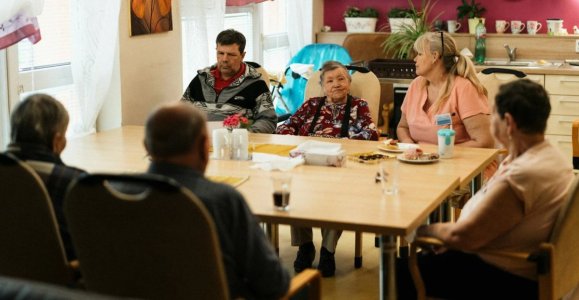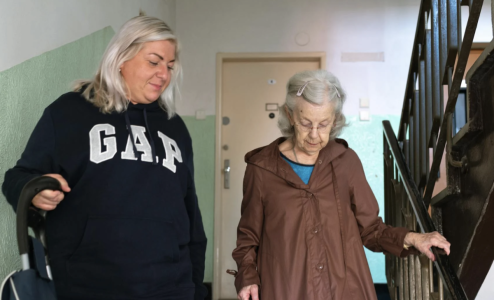Will senior support programs survive new federal budget changes? Here’s what we know
By
Veronica E.
- Replies 0
For millions of older adults, social connection isn’t just comforting—it’s essential.
A brief visit or casual conversation can ease the heavy toll of loneliness.
Volunteer programs have long played a key role in helping seniors feel seen, heard, and supported.
But now, those very lifelines may be at risk.
Recent policy changes threaten to cut the funding that keeps them going.

Social isolation poses serious health risks
Social isolation is more than just a feeling—it’s a growing public health concern.
According to a 2020 study from the National Academies of Sciences, Engineering, and Medicine, loneliness and isolation are linked to higher risks of dementia, heart disease, depression, stroke, and even premature death.
The impact has even been compared to smoking 15 cigarettes a day.
Some of the states most affected by senior isolation include Kentucky, Louisiana, Mississippi, New Mexico, and New York, based on data from the United Health Foundation’s America’s Health Rankings.
But this issue isn’t limited to any one region—no community is completely immune.
Also read: The surprising reason more seniors are feeling lonely—no one’s talking about it
Community programs offer vital connection
Volunteer-based programs like the Senior Companion Program in New Orleans and DOROT in New York City are working to close the gap.
In New Orleans, Dorothy Williams has spent nearly 20 years volunteering through the Senior Companion Program, helping older adults feel less alone.
She’s been a companion to 90-year-old Lars Williams, offering a sense of comfort and presence in his daily life.
“Without the company she provides, Lars’ day-to-day life would be kind of a slow pace,” she said.
For his part, Lars told CBS News, “I like live people, you know? You need people around you.”
In New York City, teenagers Elizabeth Gerber and Mabinty Dakeit are building bridges across generations through their work with DOROT, a nonprofit that matches young volunteers with older adults for meaningful conversations and friendship.
“I realized that I actually have a lot of similar hobbies with them,” Mabinty said.
Elizabeth added, “It’s so easy to, just like, scroll on your phone for hours and kind of not realize you might be in a room with a bunch of people, and yet you’re not discussing anything.”
Also read: Feeling lonely or unsafe? Discover the surprising benefits of getting to know your neighbors now!
Concerns rise over potential funding cuts
Some advocates are now sounding the alarm.
Andrew MacPherson, founder and executive chair of the Foundation for Social Connection Action Network, warned that recently passed domestic policy and tax legislation—referred to by President Trump as a “big, beautiful bill”—could slash funding for federal social programs, including those aimed at helping isolated seniors.
“It is concerning for how we’re going to continue to support our seniors who are isolated and lonely in this country,” MacPherson told CBS News.
He emphasized that his organization’s goal is to preserve funding and protect effective models that deliver supportive services.
In New Orleans, Elizabeth Blackwell, director of the Senior Companionship Program, fears the program could lose close to $300,000 in federal support.
If that happens, the consequences could be severe.
“Institutionalization will be overcrowded, so deaths will increase,” she said. “It’s not where we want to be as human beings.”
Also read: Inside NYC’s anti-loneliness club: Where seniors find connection and purpose—one story at a time
Why this support matters
These programs aren’t just about friendly visits.
They often include health check-ins, help with daily tasks, and early signs of trouble that might otherwise go unnoticed.
For many seniors, they offer a sense of security and connection that helps them stay in their own homes longer.
Volunteers benefit too—building purpose, forming relationships, and creating stronger communities along the way.
Programs like these remind us that human connection is essential at any age.

Also read: Struggling to make friends as an adult? Discover the surprising ways 7 people built meaningful connections!
What you can do
If you’re concerned about the future of these programs, there are several ways to help:
In times of change, it’s more important than ever to protect the programs that help older adults stay connected and cared for.
These services do more than offer companionship—they help preserve dignity, independence, and quality of life.
As decisions about funding unfold, many are watching closely, hoping these vital connections won’t be lost.
Read next: Your home connection might not be as secure as you think—here’s what to check
 Have you or someone you love benefited from a program like this? The GrayVine community is here to listen. Share your story in the comments and help keep the conversation going—because everyone deserves to feel seen, supported, and connected.
Have you or someone you love benefited from a program like this? The GrayVine community is here to listen. Share your story in the comments and help keep the conversation going—because everyone deserves to feel seen, supported, and connected.
A brief visit or casual conversation can ease the heavy toll of loneliness.
Volunteer programs have long played a key role in helping seniors feel seen, heard, and supported.
But now, those very lifelines may be at risk.
Recent policy changes threaten to cut the funding that keeps them going.

A friendly visit or shared conversation can make a world of difference for older adults facing loneliness. Image Source: Pexels / Jsme MILA.
Social isolation poses serious health risks
Social isolation is more than just a feeling—it’s a growing public health concern.
According to a 2020 study from the National Academies of Sciences, Engineering, and Medicine, loneliness and isolation are linked to higher risks of dementia, heart disease, depression, stroke, and even premature death.
The impact has even been compared to smoking 15 cigarettes a day.
Some of the states most affected by senior isolation include Kentucky, Louisiana, Mississippi, New Mexico, and New York, based on data from the United Health Foundation’s America’s Health Rankings.
But this issue isn’t limited to any one region—no community is completely immune.
Also read: The surprising reason more seniors are feeling lonely—no one’s talking about it
Community programs offer vital connection
Volunteer-based programs like the Senior Companion Program in New Orleans and DOROT in New York City are working to close the gap.
In New Orleans, Dorothy Williams has spent nearly 20 years volunteering through the Senior Companion Program, helping older adults feel less alone.
She’s been a companion to 90-year-old Lars Williams, offering a sense of comfort and presence in his daily life.
“Without the company she provides, Lars’ day-to-day life would be kind of a slow pace,” she said.
For his part, Lars told CBS News, “I like live people, you know? You need people around you.”
In New York City, teenagers Elizabeth Gerber and Mabinty Dakeit are building bridges across generations through their work with DOROT, a nonprofit that matches young volunteers with older adults for meaningful conversations and friendship.
“I realized that I actually have a lot of similar hobbies with them,” Mabinty said.
Elizabeth added, “It’s so easy to, just like, scroll on your phone for hours and kind of not realize you might be in a room with a bunch of people, and yet you’re not discussing anything.”
Also read: Feeling lonely or unsafe? Discover the surprising benefits of getting to know your neighbors now!
Concerns rise over potential funding cuts
Some advocates are now sounding the alarm.
Andrew MacPherson, founder and executive chair of the Foundation for Social Connection Action Network, warned that recently passed domestic policy and tax legislation—referred to by President Trump as a “big, beautiful bill”—could slash funding for federal social programs, including those aimed at helping isolated seniors.
“It is concerning for how we’re going to continue to support our seniors who are isolated and lonely in this country,” MacPherson told CBS News.
He emphasized that his organization’s goal is to preserve funding and protect effective models that deliver supportive services.
In New Orleans, Elizabeth Blackwell, director of the Senior Companionship Program, fears the program could lose close to $300,000 in federal support.
If that happens, the consequences could be severe.
“Institutionalization will be overcrowded, so deaths will increase,” she said. “It’s not where we want to be as human beings.”
Also read: Inside NYC’s anti-loneliness club: Where seniors find connection and purpose—one story at a time
Why this support matters
These programs aren’t just about friendly visits.
They often include health check-ins, help with daily tasks, and early signs of trouble that might otherwise go unnoticed.
For many seniors, they offer a sense of security and connection that helps them stay in their own homes longer.
Volunteers benefit too—building purpose, forming relationships, and creating stronger communities along the way.
Programs like these remind us that human connection is essential at any age.

Community programs help older adults stay socially connected through meaningful companionship and support. Image Source: Pexels / Jsme MILA.
Also read: Struggling to make friends as an adult? Discover the surprising ways 7 people built meaningful connections!
What you can do
If you’re concerned about the future of these programs, there are several ways to help:
- Contact your local representatives to express support for funding senior support programs like the Senior Companion Program and DOROT.
- Volunteer your time—many local initiatives are looking for friendly faces and extra hands.
- Check in on neighbors or family members who may be feeling isolated. Small gestures can make a big impact.
- Stay informed about changes in federal and state budgets that affect senior services and speak up when you can.
In times of change, it’s more important than ever to protect the programs that help older adults stay connected and cared for.
These services do more than offer companionship—they help preserve dignity, independence, and quality of life.
As decisions about funding unfold, many are watching closely, hoping these vital connections won’t be lost.
Read next: Your home connection might not be as secure as you think—here’s what to check
Key Takeaways
- The Senior Companion Program in New Orleans and DOROT in New York City provide crucial companionship and support to older adults facing social isolation.
- A 2020 study linked isolation and loneliness to increased risks of dementia, heart disease, depression, stroke, and premature death.
- President Trump’s new domestic policy and tax bill could reduce federal funding for these programs by hundreds of thousands of dollars.
- Advocates warn that without this funding, more seniors may face institutionalization, overcrowding, and a loss of essential human connection.






